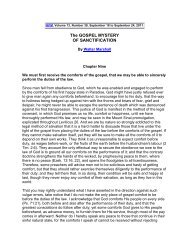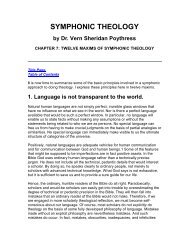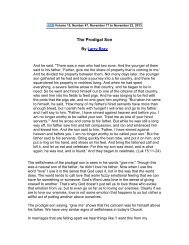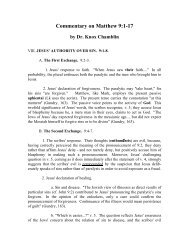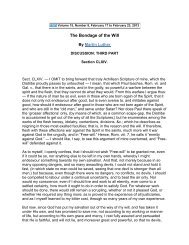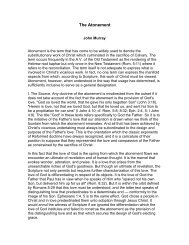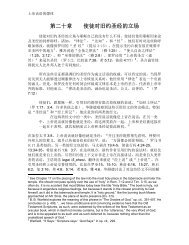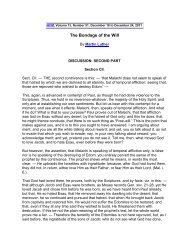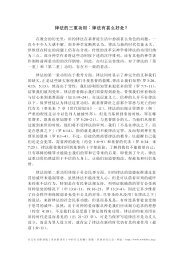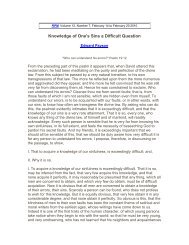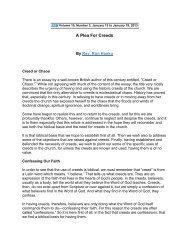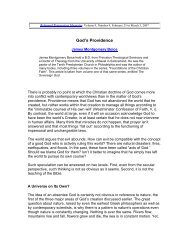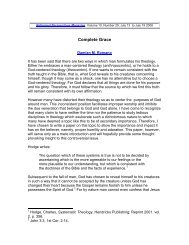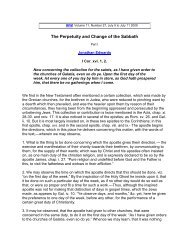Does God Speak Today Apart from the Bible - Third Millennium ...
Does God Speak Today Apart from the Bible - Third Millennium ...
Does God Speak Today Apart from the Bible - Third Millennium ...
Create successful ePaper yourself
Turn your PDF publications into a flip-book with our unique Google optimized e-Paper software.
Reformed Perspectives Magazine, Volume 9, Number 15, April 8 to April 14, 2007<br />
<strong>Does</strong> <strong>God</strong> <strong>Speak</strong> <strong>Today</strong> <strong>Apart</strong> <strong>from</strong> <strong>the</strong> <strong>Bible</strong>?<br />
This article appears as Chapter 4 in The Coming Evangelical Crisis, © Dr. John H.<br />
Armstrong, General Editor: Moody Press, Chicago, 1996. Permission to use this<br />
material has been granted by Dr. Armstrong.<br />
R. Fowler White<br />
R. Fowler While (B.A., M.A., Vanderbilt Univ.; Th.M., Dallas Theological<br />
Seminary; Ph.D., Westminster Theological Seminary) is associate professor of<br />
New Testament and Biblical Languages at Knox Theological Seminary in Ft.<br />
Lauderdale, Florida. Formerly he was a lecturer at Westminster Theological<br />
Seminary for several years and is <strong>the</strong> author of Victory and House Building in<br />
Revelation 20:1-21:8: A Thematic Study. He also has served as a freelance<br />
editor for Baker Book House and o<strong>the</strong>r publishers.<br />
Evangelical Protestant faith has always affirmed, as a central tenet of its<br />
understanding of divine revelation, that <strong>the</strong> Word of <strong>God</strong> must have supreme<br />
authority in religion. Evangelicalism has historically held this view in close<br />
conjunction with <strong>the</strong> work of <strong>the</strong> Holy Spirit. The truth can be stated this way:<br />
The living and true <strong>God</strong>, <strong>the</strong> Fa<strong>the</strong>r of our Lord Jesus Christ, who is<br />
supreme head of a living church, is not mute. He speaks — and He<br />
speaks clearly — by His Spirit and through His written word, <strong>the</strong><br />
<strong>Bible</strong>. 1<br />
Therefore, as <strong>the</strong> author of Hebrews aptly puts it, we must see to it that we do<br />
not disregard "Him who is speaking" (Heb. 12:25). 2<br />
These statements are among <strong>the</strong> claims that define those who have traditionally<br />
identified <strong>the</strong>mselves as evangelicals. They are my own affirmations as an<br />
evangelical <strong>the</strong>ologian. They are, fur<strong>the</strong>r, <strong>the</strong> affirmations of <strong>the</strong> contributors to<br />
this present volume of essays. Certain evangelicals, however, have begun to add<br />
1 Throughout this chapter, <strong>the</strong> terms <strong>the</strong> <strong>Bible</strong>, <strong>the</strong> Scriptures, and Scripture will<br />
refer to <strong>the</strong> Scriptures of <strong>the</strong> Old and New Testaments, excluding those books<br />
commonly called <strong>the</strong> Apocrypha.<br />
2 The New American Standard <strong>Bible</strong> rightly brings out <strong>the</strong> ongoing nature of<br />
<strong>God</strong>’s action of speaking by translating <strong>the</strong> present participle (ton lalounta) in<br />
Heb. 12:25 as "Him who is speaking." The accuracy of this insight is confirmed<br />
by <strong>the</strong> fact that His speaking is contrasted with <strong>God</strong>’s past warnings in <strong>the</strong> same<br />
verse.
an additional proposition. It is extremely important that we understand this<br />
additional proposition and <strong>the</strong> effect it is having on present evangelical thought<br />
and practice. A crisis is on <strong>the</strong> horizon, and those who are unaware may well be<br />
caught off guard.<br />
This new proposition states that <strong>God</strong> also speaks to His people today apart <strong>from</strong><br />
<strong>the</strong> <strong>Bible</strong>, though He never speaks in contradiction to it. As qualified as this<br />
statement seems to be, few evangelicals today would question whe<strong>the</strong>r it is true.<br />
After all, if nothing that <strong>God</strong> may say today apart <strong>from</strong> <strong>the</strong> Scriptures actually<br />
contradicts what He has already said in <strong>the</strong> Scriptures, what is <strong>the</strong> big deal?<br />
Simply put, <strong>the</strong> big deal is whe<strong>the</strong>r or not it is actually true that <strong>God</strong> speaks to His<br />
people apart <strong>from</strong> <strong>the</strong> <strong>Bible</strong>. Is this new affirmation itself a contradiction of <strong>the</strong><br />
Scriptures? Has <strong>God</strong>, in fact, told His people in <strong>the</strong> <strong>Bible</strong> that <strong>the</strong>y should hear<br />
His voice in both spoken and written words? <strong>Does</strong> not this new view threaten to<br />
set aside <strong>the</strong> historic doctrine of <strong>the</strong> sufficiency and finality of Scripture?<br />
Lest anyone be prematurely self-assured of having <strong>the</strong> right answers to <strong>the</strong>se<br />
questions, consider <strong>the</strong> issue <strong>from</strong> ano<strong>the</strong>r point of view. If we deny that <strong>God</strong><br />
speaks today apart <strong>from</strong> <strong>the</strong> Scriptures, are we quenching His Spirit (1 Thess.<br />
5:19)? Some, such as William DeArteaga, have said exactly that. 3 O<strong>the</strong>rs state<br />
<strong>the</strong> matter in an even more serious way. Jack Deere, a former Dallas Theological<br />
Seminary professor, now conference speaker, author, and Presbyterian<br />
(PCUSA) pastor, has made <strong>the</strong> following assertions:<br />
In order to fulfill <strong>God</strong>’s highest purposes for our lives we must be<br />
able to hear his voice both in <strong>the</strong> written word and in <strong>the</strong> word<br />
freshly spoken <strong>from</strong> heaven. . . Satan understands <strong>the</strong> strategic<br />
importance of Christians hearing <strong>God</strong>’s voice so he has launched<br />
various attacks against us in this area. One of his most successful<br />
attacks has been to develop a doctrine that teaches <strong>God</strong> no longer<br />
speaks to us except through <strong>the</strong> written word. Ultimately, this<br />
doctrine is demonic even [though] Christian <strong>the</strong>ologians have been<br />
used to perfect it. 4<br />
Shocking words for sure, but arresting, aren’t <strong>the</strong>y? We need a good deal of<br />
candor if we are to fully appreciate what is being said here. If DeArteaga, Deere,<br />
3 William DeArteaga, Quenching <strong>the</strong> Spirit: Examining <strong>the</strong> Centuries of<br />
Opposition to <strong>the</strong> Moving of <strong>the</strong> Holy Spirit (Altamonte Springs, Fla.: Creation<br />
House, 1992).<br />
4 Mark Thompson, "Spiritual Warfare: What Happens When I Contradict Myself,"<br />
The Briefing no. 45/46 (24 April 1990): 11. This quotation, originally taken <strong>from</strong> a<br />
1990 conference talk by Jack Deere, is cited without denial, qualification, or<br />
retraction by Deere in his essay "Vineyard Position Paper #2: The Vineyard’s<br />
Response to The Briefing" (Anaheim, Calif.: Association of Vineyard Churches,<br />
1992), 22-23.
and o<strong>the</strong>rs of similar mind are right, if <strong>the</strong> <strong>Bible</strong> does indeed teach <strong>the</strong> church to<br />
hear <strong>God</strong>’s voice both through its pages and apart <strong>from</strong> <strong>the</strong>m in words "freshly<br />
spoken <strong>from</strong> heaven," <strong>the</strong>n <strong>the</strong> contributors to this present volume and those who<br />
agree with <strong>the</strong>m are at least guilty of quenching <strong>the</strong> Spirit, if not of outright refusal<br />
to hear <strong>the</strong> very voice of <strong>God</strong>. We, of all people, are especially in need of fanning<br />
into flame those gifts of <strong>the</strong> Spirit through which <strong>God</strong> would speak to His church<br />
today (cf. 2 Tim. 1:6).<br />
With this fuller appreciation for what is at stake, I will evaluate certain key<br />
arguments that have led o<strong>the</strong>rs to affirm that <strong>God</strong> still speaks today apart <strong>from</strong><br />
<strong>the</strong> <strong>Bible</strong>. In <strong>the</strong> past we might have turned to Pentecostal and charismatic<br />
teachers for such argumentation, since this affirmation has been a defining trait<br />
and modus operandi of <strong>the</strong>ir circles. But in recent years a whole new wave of<br />
evangelicalism has arisen among teachers <strong>from</strong> historically non-Pentecostal and<br />
noncharismatic circles. These teachers and authors have been at <strong>the</strong> forefront of<br />
<strong>the</strong> whole discussion regarding <strong>the</strong> hearing of <strong>God</strong>’s voice. Because of this new<br />
group of influential teachers, we will focus our particular attention on <strong>the</strong><br />
arguments advanced by <strong>the</strong>m, principally Wayne Grudem and Jack Deere.<br />
Though this may mean that I must entertain some views unique to Grudem and<br />
Deere, it is never<strong>the</strong>less my aim to take into account what is distinctive to all who<br />
affirm <strong>the</strong> doctrine that <strong>God</strong> speaks today apart <strong>from</strong> <strong>the</strong> <strong>Bible</strong>. 5<br />
DEFINING OUR TERMS<br />
We need to ask ourselves, first, what does it mean to say that "<strong>God</strong> speaks<br />
today"? Keeping in mind <strong>the</strong> traditional meaning that "<strong>God</strong> speaks today through<br />
<strong>the</strong> <strong>Bible</strong>," <strong>the</strong> phrase has come to be used in two o<strong>the</strong>r senses. For some, <strong>the</strong><br />
words "<strong>God</strong> speaks today" are simply a popular, if misleading, way of describing<br />
<strong>the</strong> fact that <strong>God</strong> guides and directs His people by His Spirit in <strong>the</strong> application of<br />
His written word through promptings, impressions, insights, and <strong>the</strong> like. Most<br />
non-Pentecostals and noncharismatics have explained <strong>the</strong>se (more or less)<br />
intuitive experiences in terms of <strong>the</strong> Spirit’s works of illumination, leading, and<br />
conviction. A few would even acknowledge that, among those who fit a given<br />
psycho-spiritual profile, <strong>the</strong>se experiences might be accompanied by things seen<br />
or heard. All of <strong>the</strong>se experiences are, however, carefully distinguished <strong>from</strong> <strong>the</strong><br />
Spirit’s work of revelation. 6 Hence, though <strong>the</strong> Spirit’s illumination and guidance<br />
5 For an informative, detailed, and (virtually) nonevaluative survey of charismatic<br />
views of prophecy, see Mark J. Cartledge, "Charismatic Prophecy: A Definition<br />
and Description," Journal of Pentecostal Theology 5 (1994): 79-1 20.<br />
6 Illustrative of this viewpoint are <strong>the</strong> following words <strong>from</strong> John Murray ("The<br />
Guidance of <strong>the</strong> Holy Spirit," in Collected Writings of John Murray, Volume 1: The<br />
Claims of Truth [Edinburgh: Banner of Truth, 19761):<br />
We must rely upon <strong>the</strong> Holy Spirit to direct and guide us in <strong>the</strong> understanding and<br />
application of <strong>God</strong>’s will as revealed in Scripture, and we must be constantly
may sometimes focus on phenomena such as promptings or impressions, those<br />
phenomena are not specifically interpreted as involving <strong>the</strong> biblical ministry-gifts<br />
of revelation, such as prophecy and tongues or <strong>the</strong>ir correlates (e.g., visions,<br />
dreams, auditions).<br />
O<strong>the</strong>rs, of course, use <strong>the</strong> words "<strong>God</strong> speaks today" to mean that He guides<br />
and directs His people by giving <strong>the</strong>m words of direction through all <strong>the</strong> same<br />
media that <strong>the</strong> <strong>Bible</strong> portrays Him as using in <strong>the</strong> past (e.g., visions and<br />
auditions, prophets and angels). As Deere says, "<strong>God</strong> can and does give<br />
personal words of direction to believers today that cannot be found in <strong>the</strong> <strong>Bible</strong>. I<br />
do not believe that he gives direction that contradicts <strong>the</strong> <strong>Bible</strong>, but direction that<br />
cannot be found in <strong>the</strong> <strong>Bible</strong>." 7 We find <strong>the</strong> evidence for this claim, Deere argues,<br />
in <strong>the</strong> various methods <strong>God</strong> has used in <strong>the</strong> past to speak to His people.<br />
For example, during <strong>the</strong> age of <strong>the</strong> Old Testament, Deere observes, "<strong>God</strong> spoke<br />
to his children ... in an audible voice, in dreams and visions, through<br />
circumstances and fleeces, through inner impressions, through prophets, through<br />
angels and through Scripture. " 8 Turning to <strong>the</strong> Gospels, Deere notes that ‘one of<br />
<strong>the</strong> basic keys to <strong>the</strong> ministry of Jesus was that he only did what he saw his<br />
Fa<strong>the</strong>r doing and he only spoke <strong>the</strong> words that his Fa<strong>the</strong>r gave him to speak." 9<br />
conscious of our need of <strong>the</strong> Holy Spirit to apply <strong>the</strong> Word effectively to us in<br />
each situation. The function of <strong>the</strong> Holy Spirit in such matters is that of<br />
illumination as to what <strong>the</strong> will of <strong>the</strong> Lord is, and of imparting to us <strong>the</strong><br />
willingness and strength to do that will. . . As we are <strong>the</strong> subjects of this<br />
illumination and are responsive to it, and as <strong>the</strong> Holy Spirit is operative in us to<br />
<strong>the</strong> doing of <strong>God</strong>’s will, we shall have feelings, impressions, convictions, urges,<br />
inhibitions, impulses, burdens, resolutions. Illumination and direction by <strong>the</strong> Spirit<br />
through <strong>the</strong> Word of <strong>God</strong> will focus <strong>the</strong>mselves in our consciousness in <strong>the</strong>se<br />
ways. . . It is here, however, that careful distinction is necessary The moment we<br />
desire or expect or think that a state of our consciousness is <strong>the</strong> effect of a direct<br />
intimation to us of <strong>the</strong> Holy Spirit’s will, or consists in such an intimation and is<br />
<strong>the</strong>refore in <strong>the</strong> category of special direction <strong>from</strong> him, <strong>the</strong>n we have given way to<br />
<strong>the</strong> notion of special, direct, detached communication <strong>from</strong> <strong>the</strong> Holy Spirit. And<br />
this, in respect of its nature, belongs to <strong>the</strong> same category as belief in special<br />
revelation. The only way whereby we can avoid this error is to maintain that <strong>the</strong><br />
direction and guidance of <strong>the</strong> Holy Spirit is through <strong>the</strong> means which he has<br />
provided, and that his work is to enable us rightly to interpret and apply <strong>the</strong><br />
Scripture in <strong>the</strong> various situations of life, and to enable us to, interpret all <strong>the</strong><br />
factors which enter into each situation in <strong>the</strong> light of Scripture. (pp. 188-89).<br />
7 Deere, "Vineyard Position Paper #2," 15. The similarity between Deere’s<br />
teaching and that of Pentecostal <strong>the</strong>ologian J. Rodman Williams (Renewal<br />
Theology [Grand Rapids: Zondervan, 1988-921, 1:43-44 and 2:382) is worth<br />
noting.<br />
8 Deere, "Vineyard Position Paper #2," 23.<br />
9 Ibid.
According to Deere, <strong>the</strong> same pattern can be seen in Acts: "Special guidance<br />
[was] given to <strong>the</strong> apostles and o<strong>the</strong>rs by visions, angelic voices, <strong>the</strong> Holy Spirit,<br />
etc." 10<br />
Finally, in <strong>the</strong> New Testament epistles, Paul instructs <strong>the</strong> churches concerning<br />
<strong>the</strong>ir use of <strong>the</strong> revelatory gifts of "prophecy, tongues, words of wisdom, words of<br />
knowledge, and discernment of Spirits [sic]." 11 Moreover, as Deere understands<br />
it, <strong>the</strong> author of Hebrews expresses his belief that angelic visitations were<br />
possible in his day when he reminded his readers that "some have entertained<br />
angels unawares" (13:2 KJV). 12<br />
By contrast, <strong>the</strong>n, with <strong>the</strong> previous definition of <strong>the</strong> phrase "<strong>God</strong> speaks today,"<br />
Deere concludes that "on a prima facie reading of <strong>the</strong> Scriptures, one would<br />
expect <strong>God</strong> to continue communicating to his children throughout <strong>the</strong> church age<br />
with <strong>the</strong> same variety of methods he has always used." 13<br />
WORDS SO BROADLY DEFINED<br />
Let’s admit it: <strong>the</strong> idea that <strong>God</strong> continues to communicate with us using exactly<br />
<strong>the</strong> same methods that He has always used is not only provocative but has a<br />
certain attraction. Making it all <strong>the</strong> more interesting, Deere’s contention that <strong>the</strong><br />
issue of whe<strong>the</strong>r <strong>God</strong> speaks today apart <strong>from</strong> <strong>the</strong> <strong>Bible</strong> is basically a matter of<br />
recognizing that <strong>God</strong> uses <strong>the</strong> same means to communicate today as He used in<br />
<strong>the</strong> past. 14<br />
As we ponder this claim, let us not make <strong>the</strong> mistake of saying that <strong>God</strong> has<br />
never spoken apart <strong>from</strong> Scripture, for indeed He has done just that. For<br />
example, though Moses had committed to writing <strong>the</strong> words <strong>God</strong> spoke to him,<br />
<strong>God</strong> continued to speak apart <strong>from</strong> those Scriptures through <strong>the</strong> prophets who<br />
came after Moses. Having elicited this acknowledgment <strong>from</strong> us, however, Deere<br />
wants us to take an additional step: he urges that, as <strong>God</strong> has done in <strong>the</strong> past,<br />
so we should expect Him to do in <strong>the</strong> present.<br />
10 Ibid.<br />
11 Ibid.<br />
12 Ibid.<br />
13 Ibid. Deere’s description of hearing <strong>God</strong>’s voice is profoundly similar to <strong>the</strong><br />
(more or less) typical charismatic description. See Cartledge, "Charismatic<br />
Prophecy," 82-99.<br />
14 See not only Deere’s "Vineyard Position Paper #2," 22-24, but also his<br />
Surprised by <strong>the</strong> Power of <strong>the</strong> Spirit: A Former Dallas Seminary Professor<br />
Discovers That <strong>God</strong> <strong>Speak</strong>s and Heals <strong>Today</strong> (Grand Rapids: Zondervan, 1993),<br />
213-15.
As noble as Deere’s conclusion may sound, it is a seriously deficient <strong>the</strong>ological<br />
view precisely because it does not respect <strong>the</strong> biblical link between <strong>the</strong> means<br />
through which <strong>God</strong> spoke and <strong>the</strong> content He conveyed through those means,<br />
namely, His very words. In this light we must observe that, despite his intentions<br />
to <strong>the</strong> contrary, Deere actually depreciates <strong>the</strong> means through which <strong>God</strong> has<br />
communicated in <strong>the</strong> past. He insists that those means are always connected<br />
with "words of direction" <strong>from</strong> <strong>God</strong> without defining those words in o<strong>the</strong>r than<br />
personal and ministerial terms. But, by defining <strong>the</strong>se words so broadly, he<br />
leaves <strong>the</strong> impression that <strong>the</strong> words <strong>God</strong> spoke long ago are on a par with <strong>the</strong><br />
words He speaks today. That parity is actually crucial to Deere’s whole agenda.<br />
The simple problem is this: It is not true. To see this fact, we need only<br />
reconsider Deere’s examples.<br />
As <strong>the</strong> Old Testament portrays it, whenever <strong>God</strong> spoke apart <strong>from</strong> Scripture in<br />
<strong>the</strong> past, He never spoke, or had o<strong>the</strong>rs speak, anything o<strong>the</strong>r than His very own<br />
words. Just how radically true this was in Old Testament days is emphasized in<br />
Deuteronomy 18, arguably <strong>the</strong> fundamental biblical text on <strong>the</strong> role of <strong>the</strong> Old<br />
Testament prophet. <strong>Speak</strong>ing of <strong>the</strong> prophets to and through whom He would<br />
speak after Moses, <strong>God</strong> Himself says, "I will put My words in his mouth, and he<br />
shall speak to <strong>the</strong>m all that I command him. . . . Whoever will not listen to My<br />
words which he shall speak in My name, I Myself will require it of him" (vv. 18-<br />
19) 15 Therefore, during <strong>the</strong> Old Testament period, <strong>the</strong> words of direction that <strong>God</strong><br />
spoke "apart <strong>from</strong> <strong>the</strong> Scriptures" (i.e., apart <strong>from</strong>, say, <strong>the</strong> writings of Moses)<br />
were His own words, always expressing accurately what He intended to<br />
communicate and invariably invested with absolute authority.<br />
What was true of <strong>God</strong>’s speech alongside <strong>the</strong> Scriptures during <strong>the</strong> Old<br />
Testament period was also true of his speech alongside <strong>the</strong> Old Testament<br />
Scriptures during <strong>the</strong> ministries of Jesus and <strong>the</strong> apostles. The words that <strong>the</strong><br />
Fa<strong>the</strong>r spoke to Jesus, and that Jesus spoke in turn to His hearers, were not less<br />
than <strong>the</strong> Fa<strong>the</strong>r’s very own words. Deere is right to call our attention here<br />
especially to John’s gospel, which has a particular interest in <strong>the</strong> Fa<strong>the</strong>r’s<br />
communication with and through His Son (see John 3:34; 7:16; 8:28; 12:49-50;<br />
14:10, 24, 31).<br />
Similarly, <strong>the</strong> words of direction that <strong>God</strong> communicated to and through <strong>the</strong><br />
apostles were His very words. This is <strong>the</strong> import of Jesus’ remarks to <strong>the</strong><br />
apostles during His Farewell Discourse: "But <strong>the</strong> Helper, <strong>the</strong> Holy Spirit, whom<br />
<strong>the</strong> Fa<strong>the</strong>r will send in My name, He will teach you all things, and bring to your<br />
remembrance all that I said to you (John 14:26). Again Jesus said to <strong>the</strong>m:<br />
15 In Numbers 12:6-8 and Deuteronomy 13:1-5, <strong>God</strong> links <strong>the</strong> activity of <strong>the</strong><br />
prophet with <strong>the</strong> dreams and visions of <strong>the</strong> seer. Notice that, even when <strong>God</strong><br />
employed different media to speak with <strong>the</strong> prophets after Moses, that distinction<br />
did not change <strong>the</strong> nature of what <strong>the</strong>y spoke: <strong>the</strong>y, like Moses, spoke <strong>the</strong> very<br />
words of <strong>God</strong>.
When He, <strong>the</strong> Spirit of truth, comes, He will guide you into all <strong>the</strong><br />
truth; for He will not speak on His own initiative, but whatever He<br />
hears, He will speak; and He will disclose to you what is to come.<br />
He will glorify Me, for He will take of Mine and will disclose it to you.<br />
(16:13-14).<br />
Thus, Paul, whom Christ added to His apostolate, says of himself and his fellow<br />
apostles, (1) <strong>the</strong> Holy Spirit made known to <strong>the</strong>m <strong>the</strong> things freely given to us<br />
believers by <strong>God</strong> (1 Cor. 2:10, 12), and (2) <strong>the</strong>y spoke of those things, "not in<br />
words taught by human wisdom, but in those [words] taught by <strong>the</strong> Spirit"<br />
(2:13)—words invariably accurate and fully authoritative. 16<br />
The same is evident in Acts: <strong>the</strong> words of direction that <strong>God</strong> communicated to<br />
and through <strong>the</strong> apostles and o<strong>the</strong>rs were always His very own words. Deere and<br />
those who agree with him are fond of citing Acts 16:9-10 (Paul’s vision of <strong>the</strong><br />
Macedonian call) as an example of <strong>the</strong> personal-ministerial and extrabiblical<br />
revelation that does not contradict <strong>God</strong>’s revelation in Scripture. 17 Certainly <strong>the</strong><br />
revelation in this passage is "personal-ministerial and extrabiblical," that is, apart<br />
<strong>from</strong> Scripture as it existed at that point. But, just as certainly, it is nothing less<br />
than one of those always accurate, invariably authoritative words <strong>from</strong> <strong>God</strong>.<br />
Consistent with this portrayal of <strong>the</strong> apostles in Acts, <strong>the</strong> New Testament<br />
prophets are, at least ostensibly, depicted in Acts as following in <strong>the</strong> footsteps of<br />
<strong>the</strong>ir Old Testament forebears — that is, <strong>the</strong>y too receive words <strong>from</strong> <strong>God</strong><br />
through <strong>the</strong> Spirit that are His very own words. There are only three occasions in<br />
<strong>the</strong> New Testament where <strong>the</strong> actual contents of a specific post-Pentecost<br />
prophecy are recorded: <strong>the</strong> two prophecies of Agabus (Acts 11:27-28; 21:10-11)<br />
and <strong>the</strong> prophecy of John in <strong>the</strong> book of Revelation. 18 We may leave aside <strong>the</strong><br />
example of <strong>the</strong> book of Revelation, since no one discussing <strong>the</strong> issue before us<br />
questions that <strong>the</strong> visions in that book communicated <strong>God</strong>’s own words.<br />
As for Agabus, Luke portrays this New Testament prophet as one who spoke<br />
whatever words <strong>the</strong> Holy Spirit had to say In fact, in Acts 21:10, 11,<br />
16 Wayne Grudem, Systematic Theology: An Introduction to Biblical Doctrine<br />
(Grand Rapids: Zondervan, 1994), 60-61.<br />
17 I first heard Deere cite this passage in a paper presentation at <strong>the</strong> annual<br />
meeting of <strong>the</strong> Evangelical Theological Society November 1991. See also his<br />
"Appendix 7: The Sufficiency of Scripture and Distortion of What Scripture<br />
Teaches About Itself," in The Kingdom and <strong>the</strong> Power: Are Healing and <strong>the</strong><br />
Spiritual Gifts Used by Jesus and <strong>the</strong> Early Church Meant for <strong>the</strong> Church <strong>Today</strong>?<br />
ed. Gary S. Greig and Kevin N. Springer (Ventura, Calif.: Regal, 1993), 440.<br />
18 Richard B. Gaffin, "A Friend’s Response to Wayne Grudem" (paper presented<br />
at <strong>the</strong> annual meeting of <strong>the</strong> Evangelical Theological Society, 21 November<br />
1992), 2.
Agabus’ use of dramatic symbol and quotation formula [tying his<br />
own hands and feet with Paul’s belt and introducing his oracle with<br />
<strong>the</strong> words ‘This is what <strong>the</strong> Holy Spirit says’] would have signaled to<br />
his audience that [his] prophecy was <strong>the</strong> same in kind as oracles<br />
delivered by OT prophets. 19<br />
Indeed, though some persist in questioning <strong>the</strong> accuracy of Agabus’s prophecy in<br />
Acts 21, "in every respect, Luke expected his readers to view Agabus in<br />
continuity with OT prophets." 20<br />
We cannot discuss <strong>the</strong>m here, but o<strong>the</strong>r instances <strong>from</strong> Acts confirm that <strong>the</strong><br />
words communicated to <strong>the</strong> apostles and o<strong>the</strong>rs through many different media<br />
were invariably accurate, fully authoritative words <strong>from</strong> <strong>God</strong> (e.g., Acts 8:26, 29;<br />
9:10-12; 10:9-19; 13:1-3; 18:9-10). As for <strong>the</strong> angelic visitations to which <strong>the</strong><br />
author of Hebrews refers (Heb. 13:2), <strong>the</strong> only words <strong>the</strong> <strong>Bible</strong> ever represents<br />
<strong>God</strong>’s angels as speaking or o<strong>the</strong>rwise communicating were <strong>God</strong>’s very own<br />
(Heb. 2:2; Gen. 18-19; Zech. 1:14-16; Rev. 1:1; 22:6).<br />
My aim in all that I have considered so far is to demonstrate that — for all <strong>the</strong><br />
interest Deere has in teaching us <strong>the</strong> biblical model of hearing <strong>God</strong> as practiced<br />
by Jesus, <strong>the</strong> apostles, and o<strong>the</strong>rs — he fundamentally misrepresents <strong>the</strong> very<br />
model he has chosen. Deere creates <strong>the</strong> impression that <strong>the</strong> revelatory words<br />
<strong>God</strong> spoke in biblical times are on a par with <strong>the</strong> words He speaks today Even if<br />
he is right that <strong>the</strong> "words of direction" in <strong>the</strong> <strong>Bible</strong> are both personal and<br />
ministerial words, he has still not produced a single incontrovertible biblical<br />
19 John W Hilber, "Diversity of OT Prophetic Phenomena and NT Prophecy,"<br />
Westminster Theological Journal 56 (1994): 255. Also, <strong>the</strong> introductory phrase<br />
Agabus uses (tade legei) is identical to <strong>the</strong> phrase John uses to introduce his<br />
direct quotation of Christ’s messages to <strong>the</strong> seven churches of Asia Minor in<br />
Revelation 2:1, 8, 12, 18; 3:1, 7, 14 (Robert L. Thomas, "Prophecy<br />
Rediscovered? A Review of <strong>the</strong> Gift of Prophecy in <strong>the</strong> New Testament and<br />
<strong>Today</strong>" Biblio<strong>the</strong>ca Sacra 149 119921:91). Moreover, <strong>the</strong> words are equivalent to<br />
<strong>the</strong> phrase "what <strong>the</strong> Spirit says to <strong>the</strong> churches," which closes each of Christ’s<br />
messages (Rev. 2:7, 11, 17, 29; 3:6, 13, 22). Fur<strong>the</strong>rmore, as Hilber (p. 255 n.<br />
47) points out, Grudem fails to take into account that Agabus’s introductory<br />
words are <strong>the</strong> quotation formula in <strong>the</strong> Greek Old Testament for "Thus says <strong>the</strong><br />
Lord." Clearly, this is <strong>the</strong> most relevant background for our interpretation of Acts<br />
21:11. In fact, Hilber (ibid.) points out that Agabus’s "substitution of ‘Holy Spirit’<br />
for ‘Yahweh’ [<strong>the</strong> LORD] is consistent with <strong>the</strong> <strong>the</strong>ological tendency in Acts to<br />
attribute divine work to <strong>the</strong> Holy Spirit."<br />
20 Hilber, "Diversity of OT Prophetic Phenomena," 256. Hilber notes that Grudem<br />
concedes <strong>the</strong> accuracy of Agabus’s prophecy in Acts 11:28. On <strong>the</strong> accuracy, if<br />
imprecision, of Agabus in Acts 21, see Hilber (pp. 250 n. 31, 255-56) and <strong>the</strong><br />
literature he cites, as well as David B. McWilliams, "Something New Under <strong>the</strong><br />
Sun?" Westminster Theological Journal 54 (1992): 325-26.
example in which those words are anything o<strong>the</strong>r than <strong>God</strong>’s very own words. To<br />
<strong>the</strong> contrary, in every example that has come to my attention, <strong>God</strong> saw to it that<br />
whatever He intended to communicate was always accurately expressed and<br />
invariably invested with His authority This brings me to some important evidence<br />
I have not yet considered — namely, Paul’s instructions regarding <strong>the</strong> church’s<br />
use of <strong>the</strong> revelatory gifts.<br />
NO LONGER SPEAKING AS BEFORE<br />
Deere’s aim is to persuade that just as <strong>God</strong> used revelatory gifts to give words of<br />
direction to His children in biblical days, so He still does today But this is simply<br />
not <strong>the</strong> whole picture. For Deere, <strong>the</strong> words <strong>God</strong> speaks today through those<br />
gifts are simply not on a par with <strong>the</strong> inerrant, fully authoritative words that He<br />
spoke in <strong>the</strong> past. 21 To find <strong>the</strong> basis of Deere’s affirmations here, we must turn<br />
to Professor Wayne Grudem’s influential writings on New Testament prophecy. 22<br />
Grudem’s position can be summarized this way: In <strong>the</strong> New Testament gift of<br />
prophecy (and its correlates — visions, dreams, auditions, words of knowledge,<br />
and wisdom) <strong>the</strong> church should find a source of practical, though fallible,<br />
guidance. To adequately consider this proposition, we must notice that Grudem<br />
says very plainly that <strong>God</strong> now speaks as He has never previously spoken.<br />
Though <strong>the</strong> means through which <strong>God</strong> speaks are purportedly <strong>the</strong> same, <strong>the</strong><br />
words He speaks are different <strong>from</strong> everything He has said before — to <strong>the</strong> Old<br />
21 Deere has intimated his agreement with Grudem’s position on New Testament<br />
prophecy, which denies <strong>the</strong> infallibility of present-day prophetic utterances (see<br />
n. 22 below). Never<strong>the</strong>less, in his published comments on <strong>God</strong>’s "fresh words<br />
<strong>from</strong> heaven," Deere has not explicitly ruled out <strong>the</strong> possibility that those words<br />
may be <strong>God</strong>’s own words unmixed with words <strong>from</strong> o<strong>the</strong>r sources. All he has said<br />
is that <strong>the</strong>y do not contradict <strong>the</strong> <strong>Bible</strong>. The latter affirmation does not preclude<br />
<strong>the</strong> infallibility of <strong>the</strong>se "fresh" words of direction, provided Deere believes that<br />
<strong>God</strong> reveals His will on two tracks, one public and one private. On this latter<br />
point, see <strong>the</strong> conclusion to this chapter.<br />
22 See Wayne Grudem, The Gift of Prophecy in <strong>the</strong> New Testament and <strong>Today</strong><br />
(Westchester, Ill.: Crossway, 1988); and Grudem, Systematic Theology, 1049-61.<br />
Though not explicitly stated in his writings to date, Deere’s indebtedness to and<br />
general agreement with Grudem are discernible and o<strong>the</strong>rwise well known<br />
among those who have heard him comment on <strong>the</strong> subject of New Testament<br />
prophecy In a planned forthcoming book, tentatively entitled Surprised by <strong>the</strong><br />
Voice of <strong>God</strong>, Deere’s own thoughts on <strong>the</strong> New Testament revelatory gifts will<br />
be published. For <strong>the</strong> present essay, <strong>the</strong> broad outline of his teaching and its<br />
compatibility with Grudem’s views have been gleaned <strong>from</strong> "Vineyard Position<br />
Paper #2," 14-15, 22-24; and <strong>from</strong> Surprised by <strong>the</strong> Power of <strong>the</strong> Spirit, chap. 10<br />
("Why <strong>God</strong> Gives Miraculous Gifts") and Epilogue ("Hearing <strong>God</strong> <strong>Speak</strong> <strong>Today</strong>").
Testament saints, to Jesus, to <strong>the</strong> apostles. In short, <strong>the</strong> words <strong>God</strong> speaks have<br />
been redefined, for <strong>the</strong>y are no longer His very words, inerrant and authoritative.<br />
If <strong>the</strong> <strong>Bible</strong> actually says that this is <strong>the</strong> case, <strong>the</strong>n so be it. But we need to<br />
consider Grudem’s evidence <strong>from</strong> <strong>the</strong> <strong>Bible</strong>. Aside <strong>from</strong> his treatment of Agabus<br />
<strong>the</strong> prophet, Grudem’s chief support for prophecy as a source of fallible practical<br />
guidance comes <strong>from</strong> two texts: 1 Corinthians 14:29 and I Thessalonians 5:20-<br />
22.<br />
In 1 Corinthians 14:29, Paul writes, "Let two or three prophets speak, and let <strong>the</strong><br />
o<strong>the</strong>rs pass judgment." The issue relevant to our concerns is <strong>the</strong> unidentified<br />
object on which "<strong>the</strong> o<strong>the</strong>rs pass judgment." Is it <strong>the</strong> true and false elements in<br />
each oracle, 23 or is it <strong>the</strong> true and false oracles (of true and false prophets,<br />
respectively) among <strong>the</strong> many oracles <strong>the</strong> church heard? As o<strong>the</strong>rs have done,<br />
Grudem takes <strong>the</strong> former view, primarily because <strong>the</strong> Greek verb (diakrino)<br />
translated "pass judgment" involves a sorting or sifting activity 24 In favor of <strong>the</strong><br />
latter view, note that Paul refers to "prophets" (plural) speaking <strong>the</strong>ir revelations<br />
in 14:29-30, not to mention "prophecies" (plural) in 1 Thessalonians 5:20. In o<strong>the</strong>r<br />
words, <strong>the</strong> apostle presupposes that <strong>the</strong> churches would be hearing multiple<br />
prophecies <strong>from</strong> multiple prophets. In this light, Grudem’s interpretation is clearly<br />
not in keeping with Paul’s exact words. The apostle does not instruct <strong>the</strong><br />
churches to sort out <strong>the</strong> true and false elements in any particular prophecy.<br />
Ra<strong>the</strong>r, he instructs <strong>the</strong>m to sort out <strong>the</strong> true and false prophecies among <strong>the</strong><br />
many <strong>the</strong>y would hear. 25<br />
When we compare this view of 1 Corinthians 14:29 with <strong>the</strong> use of <strong>the</strong> verb<br />
diakrino within and outside <strong>the</strong> New Testament, we find that it is perfectly<br />
consistent with that usage: The verb is applied to sifting wheat <strong>from</strong> chaff (Philo),<br />
distinguishing <strong>the</strong> clean <strong>from</strong> <strong>the</strong> unclean (Josephus), separating <strong>the</strong> guilty <strong>from</strong><br />
o<strong>the</strong>rs (Josephus), discerning good <strong>from</strong> evil (Testament of Asher), sorting true<br />
<strong>from</strong> false (Philo), distinguishing Jews <strong>from</strong> Gentiles (Acts 15:9; cf. 11:2),<br />
distinguishing certain people <strong>from</strong> o<strong>the</strong>rs (1 Cor. 4:7), and forming a right<br />
(instead of a wrong) judgment of oneself (11:31) 26 This evidence falsifies<br />
Grudem’s claim that <strong>the</strong> New Testament prefers - and Paul would have preferred<br />
— <strong>the</strong> verb krino over diakrino "when speaking of judgments where <strong>the</strong>re are<br />
only two possibilities, such as ‘guilty’ or ‘not guilty’, ‘right’ or ‘wrong’, or ‘true’ or<br />
23<br />
Grudem, The Gift of Prophecy, 74-79; cf. 104-5.<br />
24<br />
Ibid., 76-79. Of I Corinthians 14:29, M. M. B. Turner ("Spiritual Gifts Then and<br />
Now," Vox Evangelica 15 119851) has written, "The presupposition is that any<br />
one New Testament prophetic oracle is expected to be mixed in quality, and <strong>the</strong><br />
wheat must be separated <strong>from</strong> <strong>the</strong> chaff" (p. 16).<br />
25<br />
For a similar conclusion, see Hilber, "Diversity of OT Prophetic Phenomena,"<br />
256-58.<br />
26<br />
Grudem, The Gift of Prophecy, 76.
‘false’." 27 But we look in vain for any examples where diakrino implies judgments<br />
involving more than two possibilities.<br />
To round out our discussion of diakrino, notice its use in 1 Corinthians 6:5: "Is it<br />
so, that <strong>the</strong>re is not among you one wise man who will be able to decide between<br />
his brethren?" 28 Contrary to Grudem’s argument, in <strong>the</strong> context immediately<br />
following 6:5, Paul shows his awareness of only two possible outcomes when a<br />
believer has a grievance against his neighbor: one will be wronged or defrauded<br />
(v. 7), <strong>the</strong> o<strong>the</strong>r guilty of wrongdoing or defrauding (v. 8). The pertinent point,<br />
however, is that <strong>the</strong> wise man’s duty, as implied by diakrino, is to sort out <strong>the</strong><br />
wrongdoer <strong>from</strong> his victim on <strong>the</strong> basis of <strong>the</strong> evidence. By analogy in 1<br />
Corinthians 14:29, <strong>the</strong> duty of "<strong>the</strong> o<strong>the</strong>rs" is to sort out <strong>the</strong> true prophet <strong>from</strong> <strong>the</strong><br />
false prophet on <strong>the</strong> basis of <strong>the</strong>ir oracles (see, e.g., 1 Cor. 12:3; 14:37; cf. Eph.<br />
4:14-15 with 4:4-6,11).<br />
My conclusions are virtually <strong>the</strong> same when I consider 1 Thessalonians 5:20-22.<br />
In 5:20 Paul warns <strong>the</strong> Thessalonians not to despise prophecies. Clearly <strong>the</strong><br />
Thessalonians’ esteem for prophecy was not what it should have been. But why?<br />
As 2 Thessalonians 2:1-3, 15 suggests, <strong>the</strong>y had overreacted to an influx of false<br />
prophecies that were confusing <strong>the</strong>m and threatening to lead <strong>the</strong>m astray 29<br />
Consequently, in 1 Thessalonians 5:21-22, Paul corrects <strong>the</strong> Thessalonians’<br />
overreaction by directing <strong>the</strong>m to test everything and, having done so, to adhere<br />
to what is good and to avoid what is evil. Paul’s exact wording in 5:20<br />
("prophecies" [plural]), coupled with <strong>the</strong> testing for good and evil in verses 21-22,<br />
implies that he was expecting <strong>the</strong> church to test multiple prophecies among<br />
which <strong>the</strong>y would find false prophecies as well as true ones. 30 Thus, <strong>the</strong><br />
instructions to <strong>the</strong> Thessalonians mirror Paul’s command in 1 Corinthians 14:29:<br />
The testing of prophecies presupposes that <strong>the</strong> prophecies heard in <strong>the</strong> churches<br />
might well have included both true and false prophecies (<strong>from</strong> both true and false<br />
prophets, respectively) among <strong>the</strong>m.<br />
In light of <strong>the</strong>se factors, we have to say that Grudem fundamentally<br />
misunderstands Paul’s directives in 1 Corinthians 14:29 and 1 Thessalonians<br />
5:20-22. The accuracy of <strong>the</strong> interpretation presented here, however, is<br />
confirmed by its consistency with <strong>the</strong> broader teaching of <strong>the</strong> <strong>Bible</strong>. According to<br />
27 Ibid., 77.<br />
28 Ibid.<br />
29 According to 2 Thessalonians 2:2, a false prophet or an oracle of a false<br />
prophet ("spirit" NASB; "prophecy" NIV; Gk. pneuma) had disturbed and was<br />
threatening to deceive <strong>the</strong> Thessalonians. Contrary to Grudem’s analysis (The<br />
Gift of Prophecy, 104-5), we have no indication that <strong>the</strong>y had overreacted to<br />
Paul’s teaching that true prophecies were less authoritative than Scripture.<br />
30 Contrary to Grudem’s inference (The Gift of Prophecy, 104-5), Paul’s words do<br />
not imply that <strong>the</strong>re were many things that were not good in <strong>the</strong> true prophecies<br />
<strong>the</strong> Thessalonians were hearing.
that teaching, <strong>the</strong> church, like Israel, judged prophecies in order to separate <strong>the</strong><br />
true prophets <strong>from</strong> <strong>the</strong> false (Deut. 13:1-5; 1 Kings 13; Matt. 7:15-20 with 12:32-<br />
37 and 24:23-26; 1 John 4:1-6; cf. Rom. 16:17-19). In carrying out this<br />
responsibility, <strong>the</strong> church exercised discernment based on <strong>the</strong> explicit, absolute<br />
standards of good and evil (1 Thess. 5:21-22), truth and error (1 John 4:1-6), and<br />
thus determined <strong>the</strong> source of <strong>the</strong> prophecies <strong>the</strong>y heard, whe<strong>the</strong>r <strong>the</strong>y were<br />
<strong>from</strong> <strong>the</strong> Holy Spirit or <strong>from</strong> some o<strong>the</strong>r source. 31<br />
We may say, <strong>the</strong>refore, that for Paul and <strong>the</strong> rest of <strong>the</strong> New Testament authors,<br />
<strong>the</strong> judging of New Testament prophecies was a process of evaluating <strong>the</strong><br />
prophets’ oracles in order to pass judgment on <strong>the</strong> prophets <strong>the</strong>mselves and thus<br />
discern <strong>the</strong> source of <strong>the</strong>ir oracles. This interpretation, we submit, is alone able to<br />
account for <strong>the</strong> admonitions that Christ and His apostles gave to <strong>the</strong> church<br />
regarding false prophecies and false prophets. The church was told in no<br />
uncertain terms not to tolerate prophets whose words were false or evil and were<br />
thus a threat to lead <strong>the</strong>m astray (Matt. 7:15-20 with 12:32-37 and 24:23-26; 1<br />
John 4:1-6; 1 Thess. 5:22; 2 Thess. 2:3, 15; Rev. 2:20-23; cf. Rom. 16:17-19).<br />
CONCLUSION<br />
Some present-day evangelicals, Jack Deere and Wayne Grudem among <strong>the</strong>m,<br />
believe and teach that <strong>God</strong> speaks today apart <strong>from</strong> <strong>the</strong> <strong>Bible</strong>. According to <strong>the</strong>se<br />
teachers, <strong>God</strong> gives words of personal or ministry direction to His people using<br />
all <strong>the</strong> same means that He used in <strong>the</strong> past. Yet, when we consider <strong>the</strong><br />
evidence for <strong>the</strong>se views, we find that <strong>the</strong>ir resemblance to what <strong>the</strong> <strong>Bible</strong><br />
actually depicts is more apparent than real. Whatever else Deere is teaching, he<br />
is not teaching <strong>the</strong> model of hearing <strong>God</strong>’s voice as practiced in <strong>the</strong> <strong>Bible</strong> itself.<br />
Similarly, Grudem has transformed Paul into an eccentric who is patently out of<br />
step with o<strong>the</strong>r New Testament authors, indeed with all o<strong>the</strong>r biblical authors,<br />
when it comes to <strong>the</strong> crucial matter of judging prophecies.<br />
31 In line with this picture we find Paul citing standards by which <strong>the</strong><br />
congregations should judge prophecies (1 Cor. 12:3; 14:37; 1 Thess. 5:21-22; 2<br />
Thess. 2:15; and perhaps Eph. 4:4-15 with 4:4-6, 11). These standards are in<br />
stark contrast to Grudem’s graded scale of value and truth in New Testament<br />
prophecies. See Grudem, The Gift of Prophecy, 76-77. Strikingly, Pentecostal<br />
<strong>the</strong>ologian Williams (Renewal Theology, 2:382 n. 164, 2:386 n. 187) emphatically<br />
rejects Grudem’s interpretation of New Testament prophetic oracles as a mixture<br />
of true and false and of <strong>the</strong> judging activity applied <strong>the</strong>reto.
In my judgment, 32 what <strong>the</strong>se teachers and <strong>the</strong>ir disciples fail to appreciate is<br />
that, in <strong>the</strong> <strong>Bible</strong>, <strong>God</strong>’s activity of speaking apart <strong>from</strong> <strong>the</strong> Scriptures occurred at<br />
a time when those documents were still being written. Interestingly, during that<br />
long history of Scripture writing, <strong>God</strong>’s people did live by a "Scripture plus"<br />
principle of authority, and, in keeping with that principle, <strong>God</strong> employed various<br />
means to speak His extrascriptural words to <strong>the</strong>m. But today <strong>the</strong> church is faced<br />
with a new situation: now, with centuries of Christian orthodoxy, we confess that<br />
<strong>the</strong> writing of Scripture is finished, that <strong>the</strong> canon is actually closed.<br />
But why does <strong>the</strong> church affirm that <strong>the</strong> canon is closed? The only demonstrable<br />
basis for this affirmation is that <strong>God</strong>’s giving of revelation, spoken and written, is<br />
always historically joined to and qualified by <strong>God</strong>’s work of redemption. 33 Now<br />
that <strong>God</strong> has accomplished salvation once-for-all, in Christ, He has also spoken<br />
His word, once-for-all, in Christ and in those whom Christ authorized and<br />
empowered by His Spirit (Heb. 1:1-2; 2:3, 4; Matt. 16:15-19; John 14:26; Eph.<br />
2:19, 20). With <strong>the</strong> completion of salvation in Christ comes <strong>the</strong> cessation of<br />
revelation. Consequently, <strong>the</strong> church now lives by a "Scripture only" principle of<br />
authority To tamper with this principle invites a host of <strong>the</strong>ological and pastoral<br />
problems. The proof of this observation can be seen in <strong>the</strong> effect of <strong>the</strong>se<br />
"prophecies" upon many who are being led far afield <strong>from</strong> <strong>the</strong> sufficiency of <strong>the</strong><br />
gospel itself. Its finality and complete sufficiency is, in reality, subtly assaulted by<br />
<strong>the</strong>se claims to modern prophecies.<br />
Finally, <strong>the</strong> <strong>Bible</strong> gives us no reason to expect that <strong>God</strong> will speak to His children<br />
today apart <strong>from</strong> <strong>the</strong> Scriptures. 34 Those who teach o<strong>the</strong>rwise need to explain to<br />
<strong>God</strong>’s children how <strong>the</strong>se words "freshly spoken <strong>from</strong> heaven" can be so<br />
necessary and strategic to <strong>God</strong>’s highest purposes for <strong>the</strong>ir lives when <strong>the</strong>ir<br />
Fa<strong>the</strong>r does nothing to ensure that <strong>the</strong>y will ever actually hear those words.<br />
Indeed, <strong>the</strong>y must explain why this is not quenching <strong>the</strong> Spirit. Moreover, <strong>the</strong><br />
promise of such guidance inevitably diverts attention <strong>from</strong> <strong>the</strong> Scriptures,<br />
particularly in <strong>the</strong> practical and pressing concerns of life. Let us never<br />
32 For a more complete exposition of <strong>the</strong> concerns broached in this conclusion,<br />
see Gaffin, "A Friend's Response to Wayne Grudem," 6-12. See also Richard B.<br />
Gaffin, Perspectives on Pentecost: New Testament Teaching on <strong>the</strong> Gifts of <strong>the</strong><br />
Holy Spirit (Phillipsburg, NJ.: Presb. & Ref., 1979), 97-99, and his "The New<br />
Testament as Canon," in Inerrancy and Hermeneutic: A Tradition, A Challenge, A<br />
Debate, ed. H. M. Conn (Grand Rapids: Baker, 1988), 172-81.<br />
33 See Herman N. Ridderbos, Redemptive History and <strong>the</strong> New Testament<br />
Scriptures, 2d rev. ed., trans. H. De Jongste and rev. R. B. Gaffin, Jr.<br />
(Phillipsburg, N.J.: Presb. & Ref., 1988), passim, esp. p. 31. Of special note,<br />
though Deere teaches that <strong>the</strong> canon is closed, he fails to grasp <strong>the</strong> relationship<br />
between revelation and redemption and can <strong>the</strong>refore provide no rationale or<br />
basis for his teaching.<br />
34 It remains for those who differ with this conclusion to produce <strong>the</strong> evidence that<br />
shifts <strong>the</strong> burden of proof <strong>from</strong> <strong>the</strong>mselves to o<strong>the</strong>rs.
underestimate just how serious this diversion really is. In <strong>the</strong> <strong>Bible</strong> <strong>the</strong> church<br />
hears <strong>God</strong>’s true voice; in <strong>the</strong> Scriptures, we know that He is speaking His very<br />
words to us. Advocates of words "freshly spoken <strong>from</strong> heaven" should beware:<br />
By diverting attention <strong>from</strong> <strong>the</strong> Scriptures, <strong>the</strong>y quench <strong>the</strong> Spirit who is speaking<br />
<strong>the</strong>rein.<br />
This article is provided as a ministry of <strong>Third</strong> <strong>Millennium</strong> Ministries. If you<br />
have a question about this article, please email our Theological Editor. If you<br />
would like to discuss this article in our online community, please visit our<br />
Reformed Perspectives Magazine Forum.<br />
Subscribe to Reformed Perspectives Magazine<br />
RPM subscribers receive an email notification each time a new issue is<br />
published. Notifications include <strong>the</strong> title, author, and description of each<br />
article in <strong>the</strong> issue, as well as links directly to <strong>the</strong> articles. Like RPM itself,<br />
subscriptions are free. To subscribe to Reformed Perspectives Magazine,<br />
please select this link.



